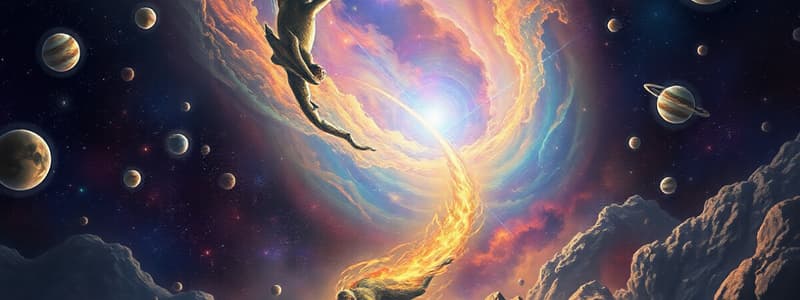Podcast
Questions and Answers
What significant prediction did Isaac Newton make regarding the end of the world?
What significant prediction did Isaac Newton make regarding the end of the world?
Newton predicted that the world would end in the year 2060.
How did the perception of Isaac Newton change with the recent uncovering of his manuscripts?
How did the perception of Isaac Newton change with the recent uncovering of his manuscripts?
The manuscripts reveal a more complex and emotional Newton, contrasting with the rationalist image commonly accepted.
What was the impact of Galileo's work on the scientific revolution that Newton was part of?
What was the impact of Galileo's work on the scientific revolution that Newton was part of?
Galileo's work challenged established beliefs and confirmed that the Earth orbits the sun, influencing the shift towards empirical science.
What type of experiments captivated Isaac Newton during his childhood?
What type of experiments captivated Isaac Newton during his childhood?
In what year was Isaac Newton born and how did this relate to the broader scientific context of his time?
In what year was Isaac Newton born and how did this relate to the broader scientific context of his time?
What motivated Isaac Newton to resist the decadent lifestyle of his fellow students at Cambridge?
What motivated Isaac Newton to resist the decadent lifestyle of his fellow students at Cambridge?
What pivotal idea about gravity did Newton allegedly develop while observing an apple fall?
What pivotal idea about gravity did Newton allegedly develop while observing an apple fall?
How did the political and social tumult of Newton's early life influence his character?
How did the political and social tumult of Newton's early life influence his character?
What was Newton's stance on the scientific views of Rene Descartes regarding the movement of planets?
What was Newton's stance on the scientific views of Rene Descartes regarding the movement of planets?
What led to Newton's return home during his time at Cambridge, and what significance did this have for his work?
What led to Newton's return home during his time at Cambridge, and what significance did this have for his work?
What is meant by 'infinitesimally small' in the context of calculus?
What is meant by 'infinitesimally small' in the context of calculus?
How did Newton's view on white light differ from the prevailing belief of his time?
How did Newton's view on white light differ from the prevailing belief of his time?
What major invention did Newton create to address the issue of chromatic aberration in telescopes?
What major invention did Newton create to address the issue of chromatic aberration in telescopes?
Describe the impact of calculus on the fields of science according to the content.
Describe the impact of calculus on the fields of science according to the content.
Why did Isaac Newton keep his discoveries, such as calculus, largely to himself?
Why did Isaac Newton keep his discoveries, such as calculus, largely to himself?
Flashcards are hidden until you start studying
Study Notes
Isaac Newton's Life and Work
- Isaac Newton was a genius scientist who uncovered the laws of physics that govern the entire cosmos.
- Newton was born in 1642, the same year as Galileo's death.
- Newton was deeply interested in science and reason from a young age.
- Newton attended Cambridge University and was a reclusive and dedicated student.
- The plague caused Newton to return home where he developed the theory of Gravity.
- Newton developed a new branch of mathematics called "calculus" to calculate constantly changing quantities.
- Newton's work on light overturned the accepted wisdom of the time, showing that white light is made up of all colors of the rainbow.
- Newton created a new type of telescope that is still used today.
- Newton was an alchemist and believed that ancient wisdom was hidden in Greek myths.
Newton's Personal Life
- Newton was deeply affected by his father's death and his mother remarrying when he was young.
- Newton was shy and reserved, keeping most of his scientific breakthroughs to himself.
- Newton was sensitive to criticism and withdrew from the scientific community after attacks on his work.
Newton's Contributions to Science
- The theory of gravity: Newton discovered that a force, gravity, holds planets in orbit around the Sun.
- The invention of calculus: Newton invented this branch of math to measure constantly changing quantities, like speed and velocity.
- The investigation of color: Newton discovered that white light is actually a combination of all the colors of the rainbow.
- The invention of the reflecting telescope: Newton built a telescope that used a mirror to gather light, eliminating color distortion.
Studying That Suits You
Use AI to generate personalized quizzes and flashcards to suit your learning preferences.




